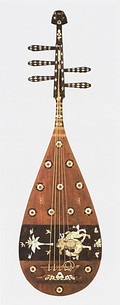【Genjo】[1]
Fujiwara-no-Moronaga, a master of biwa[2], can no longer find any better player than him in Japan, which has made him decide to go to China to improve his skill further. His party leaves Kyoto and arrives at the Suma-no-ura coast, where he decides to stay in a seawater scooper[3]’s house for the night. In response to request from an old master of the house, Moronaga plays biwa, when it begins to rain. When the rain starts to become hard, the old man takes out an old rush mat and lays it on the roof. Asked by Moronaga why, the old man says, “I did it to harmonize the sounds of the biwa and the rain.” Moronaga passes his biwa to the old man, and the old man and his wife play biwa and koto[4] respectively – it is a great performance.
The couple turns out to be the ghosts of Emperor Murakami and the empress. They disappear after saying that they showed up there to make Moronaga stop short of going to China.
(Temporary exit by the main actor)
The emperor comes out with his look of old days when he was alive. He makes a dragon deity bring “Shishimaru”, a famed, legendary biwa which is said to have sunk to the bottom of the sea. Then he gives it to Moronaga and dances splendidly in front of Moronaga.
This play is designed in a very refined and interesting manner – for example, the song which describes the old man playing biwa is arranged to fit a gagaku[5] piece “Etenraku”.
Introduction written by Ken Takahashi
Translated by Yusuke Kobayashi
[1] The name of a famed biwa2.
[2] A traditional Japanese musical instrument also known as Japanese lute.
[3] A person who scoops water from the sea to make salt.
[4] Another traditional Japanese instrument which resembles zither.
[5] Ceremonial court music of Japan.

【 玄象 】
琵琶の名手であった藤原帥長は『もはや、日本には自分より巧者はおらぬ…』と、さらなる向上を求めて渡唐を志す。都を出た一行は、須磨の浦にて汐汲の屋を宿に借りた。屋の主である老人の所望により、琵琶を弾いていると雨が降り始める。雨足が強くなり始めた時、老人は古苫を取り出して屋根に敷いた。帥長が理由を問うと、老人は『琵琶の音、雨足の音を調和させたのだ』と答えた。琵琶を老人に与えると、老人は琵琶、その妻は琴、見事な演奏を聞かせる。
実は、老人は村上天皇と皇后の霊であり、我らは帥長の渡唐を止まらせるために現れたのだと告げて消え去った。
(中入)
天皇は昔日の姿で現れる。海底に沈んだとされる伝説の名器『獅子丸』を召喚した竜神に運ばせて、帥長へ与えて、自ら華やかな舞を見せるのであった。老人が琵琶を弾く段を描写する謡いは、雅楽『越天楽』に合わせた謡物としてアレンジするなど興と趣に溢れた構想の作品である。
文 高橋 健
Yashima
During his visit around western part of Japan, a travelling monk from Kyoto (waki: the part opposite the lead) arrives at the coast of Yashima and meets two fishermen, an old one and a young one, at dusk. The monk asks them to lodge him for the night and they offer him their salt-making cottage . In response to the monk’s request, the old fisherman starts to narrate the famous battle in Yashima between the Genji and Heike clans. After describing the spectacular battle, the old man implies that he is the ghost of Minamoto-no-Yoshitsune, a great Genji warrior. Telling the monk to stay in the dream and wait, the old man fades away.
(Temporary exit by the leading actor)
Minamoto-no-Yoshitsune as a warrior appears in the monk’s dream. Yoshitsune says, “I am deep under the sea of life and death…” describing his suffering from his obsession with battle. Yoshitsune prays to the moon in the spring sky for enlightenment.
But failing to break away from the obsession, he is once again dragged into a battle in Shura-doh . In front of the monk, Yoshitsune fights a battle with ghosts of warriors who were unfortunately killed in battlefields, and disappears as the dawn breaks, leaving behind a morning storm which blows emptily.
Allegedly written by Zeami, this play “Yashima” has great depth in its framework of the both scenes, making it a masterpiece Shura-Noh play.
Introduction written by Ken Takahashi
Translated by Yusuke Kobayashi
屋島
都の旅僧(ワキ)は西国行脚の途中で屋島の浦に着き、日の暮れに漁夫の老人と若者の二人に出会う。僧は漁夫に一夜の宿を乞い、彼らの塩屋に泊まる。
老人は僧の求めに応じて、源平屋島合戦場の語りを始める。
華やかな合戦絵巻の有り様を語る老人は、自分こそが源義経の霊であると仄めかし、このまま夢を覚まさず待て、と言い残して姿を消した。
(中入)
後場・僧の夢の中へ武将姿の義経が現れる。義経は修羅の妄執に苦しむ我が身を『生死の海に沈淪せり…』と語り、春の夜に月を望み、悟りあることを願う。
しかし、妄執を捨てきれぬ義経の霊は再び修羅道の戦いに引き戻される。そして悲運の戦死を遂げた亡霊達との合戦を見せながら、夜明けと共に消え失せ、あとは空しく朝嵐が吹き抜けるのみであった。
能『屋島』は世阿弥作とされ、前・後場と重厚な構成による修羅能の大作。
